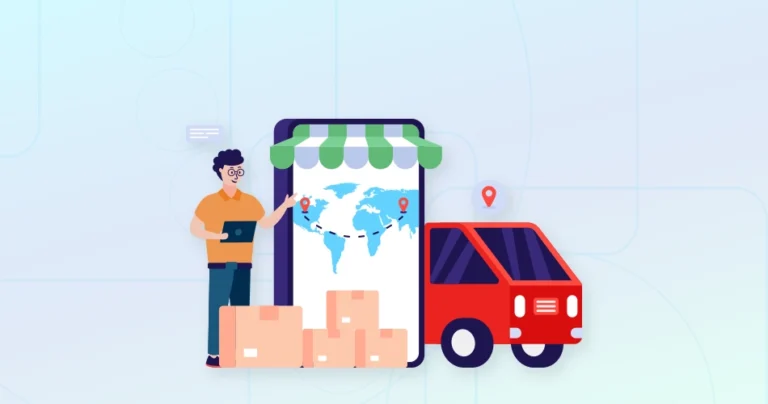When starting an eCommerce business, one of the most frequently-overlooked components is logistics. According to the lead experts, the global eCommerce logistics market is expected to grow at a CAGR of 22.3% by 2030. Doesn’t matter how innovative your products are or how good your eStore website is, without good logistics, the business will fall short.
To excel in eCommerce logistics, you must prioritize a few key elements: Inventory management, order fulfillment, transportation, and returns management.
In this blog, we’ll give you an idea on how eCommerce development services put these components in place to ensure the best results. Plus, you’ll learn about the overall purpose of logistics in eCommerce. Let’s begin.
What is Logistics?
Logistics is the process of planning, implementing, and controlling the efficient, effective flow and storage of goods, services, and related information from the point of origin to the point of consumption.
It involves the management of resources, such as transportation, warehousing, inventory control, and order fulfillment, to ensure that products reach their intended destinations on time and in good condition.
Simply put, logistics is about getting the right things to the right places at the right time.
Key Components of eCommerce Logistics
When it comes to logistics in eCommerce, there are a few key components that ensure a streamlined operation.
Suppliers
Suppliers are the foundation of any eCommerce business, providing the products that are sold online. They are responsible for manufacturing, sourcing, and supplying inventory to fulfillment centers or directly to eCommerce businesses. Effective supplier relationships are crucial for ensuring a consistent supply of products and maintaining product quality.
Fulfillment Centers
Fulfillment Centers are the operational hubs of eCommerce logistics. They are responsible for storing, picking, packing, and shipping products to customers. These facilities can range from small warehouses to large, automated distribution centers.
Efficient fulfillment operations are essential for minimizing order processing times, reducing shipping costs, and improving customer satisfaction.
Distribution Centers
Distribution Centers are larger-scale facilities that serve as strategic hubs for distributing products to multiple fulfillment centers or directly to customers. They are often used by eCommerce businesses with a national or international presence to optimize inventory management and reduce transportation costs.
These centers can help ensure that products are available in the right quantities and locations to meet customer demand.
Sorting Facilities
Sorting Facilities play a critical role in optimizing the transportation of packages. These facilities use advanced sorting technologies to efficiently group packages according to their destination. That reduces the shipping distances and improves the delivery efficiency.
By minimizing transportation costs, sorting facilities can help eCommerce businesses improve their bottom line.
Carriers
Carriers are the companies that transport products from fulfillment centers to customers. They can be parcel carriers (like FedEx, UPS, or USPS), freight carriers, or specialized carriers for specific product types (like refrigerated carriers for perishable goods).
The choice of carrier can significantly impact shipping costs, delivery times, and customer satisfaction. eCommerce businesses must carefully evaluate the options available to select the most suitable carrier for their needs.
These components of logistics play a key role in all types of eCommerce business models. So you need to consult with a professional eCommerce development company and define good management between these components. It will ensure optimal logistics performance of your eCommerce business.
Importance of Logistics in eCommerce
Logistics is the backbone of any eCommerce business. It’s the process of efficiently managing the flow of goods from the warehouse to the customer’s doorstep. A well-executed logistics strategy can significantly impact a company’s success.
Here are some key reasons why logistics is crucial in eCommerce:
- Customer Satisfaction: Timely and accurate delivery is a major factor in customer satisfaction. A poor logistics experience can lead to customer churn and negative reviews.
- Competitive Advantage: Efficient logistics can give an eCommerce business a competitive edge. Businesses that can deliver products faster and more reliably are more likely to attract and retain customers.
- Cost Efficiency: A well-optimized logistics process can help reduce costs associated with shipping, warehousing, and inventory management.
- Brand Reputation: A strong logistics infrastructure contributes to a positive brand image. Consistent and reliable delivery can enhance a company’s reputation.
- Inventory Management: Effective logistics helps manage inventory levels, preventing stockouts and excess inventory.
- Scalability: A robust logistics system is essential for scaling an eCommerce business. It must be able to handle increasing order volumes without compromising efficiency or customer service.
Businesses that invest in a strong logistics infrastructure can improve customer satisfaction, reduce costs, and enhance their competitive position. If you need help in consultation, our eCommerce consulting services experts are there for you.
How to Manage eCommerce Logistics?
Managing the logistics of your eCommerce business depends on your budget, business model and your desire for control over the process. Based on that, there are three ways to manage the logistics.
In-house Logistics
In-house logistics involves handling all aspects of the logistics process internally, from warehousing and inventory management to order fulfillment and shipping. This approach offers greater control over the entire supply chain, allowing businesses to tailor their operations to specific needs.
However, it also requires significant investment in infrastructure, personnel, and technology.
How to Manage In-house Logistics?
- Inventory Management: Implement an effective inventory tracking system to ensure accurate stock levels and prevent stockouts.
- Order Fulfillment: Optimize picking, packing, and shipping processes to minimize handling time and errors.
- Transportation: Select suitable carriers and negotiate favorable shipping rates.
- Returns Management: Develop a clear returns policy and efficient procedures for handling returns.
Suitable for: Businesses with sufficient resources, high order volume, and control-oriented strategies.
Dropshipping
Dropshipping is a business model where the retailer does not keep inventory in stock. Instead, orders are passed directly to the supplier, who fulfills the order and ships the product directly to the customer. This approach eliminates the need for warehousing and inventory management, making it a popular option for small businesses or those with limited capital.
How to Manage Dropshipping?
- Partner Selection: Choose reliable dropshipping suppliers with a good product range and competitive pricing.
- Product Listing: Integrate supplier’s product catalog into your online store.
- Order Processing: Forward customer orders to the supplier for fulfillment.
- Customer Service: Handle customer inquiries and returns in coordination with the supplier.
Suitable for: Businesses with limited capital, a wide product range, and a focus on product curation.
Third-party Logistics Providers
Third-party logistics providers are specialized companies that offer a range of logistics services, including warehousing, transportation, and order fulfillment. By outsourcing these functions to a 3PL, businesses can focus on their core competencies while benefiting from the expertise and economies of scale that 3PLs can provide.
How to Manage Third-party Logistics Providers?
- 3PL Selection: Evaluate 3PLs based on services offered, location, scalability, and pricing.
- Contract Negotiation: Establish clear terms and conditions in the contract.
- Integration: Integrate your eCommerce platform with the 3PL’s systems.
- Monitoring: Track and measure 3PL performance to ensure service level agreements (SLAs) are met.
Suitable for: Businesses of all sizes seeking to reduce costs, improve efficiency, and focus on core competencies.
Choosing the right approach depends on factors such as business size, product type, order volume, budget, and desired level of control. It’s often possible to combine different approaches, such as in-house inventory management with third-party fulfillment for specific product lines.
If you need help with setting up a logistics management network, hire dedicated Ecommerce developers from our team.
Let’s Conclude eCommerce Logistics
Logistics play an important role in the success of eCommerce business. It covers a wide range of activities, from inventory management and order fulfillment to transportation and customer service. By effectively managing these processes, businesses can enhance customer satisfaction, reduce costs, and improve their overall competitiveness.
Whether you choose to manage logistics in-house, leverage dropshipping, or partner with a 3PL, make sure to do so strategically. Ultimately, it’s about creating a reliable, scalable, and customer-centric supply chain.
If you need help with the eCommerce logistics, connect with our experts today!
FAQs on eCommerce Logistics
Q1. What technologies can be used to improve eCommerce logistics?
Warehouse management systems (WMS), transportation management systems (TMS), and radio frequency identification (RFID) are some of the technologies that can enhance logistics efficiency.
Q2. How does logistics impact the customer experience?
Logistics directly affects customer satisfaction through factors like delivery speed, accuracy, and communication. A positive logistics experience can lead to increased customer loyalty and repeat purchases.
Q3. What is the difference between logistics and shipping?
Logistics encompasses the entire process of managing the flow of goods, including transportation, warehousing, inventory management, and order fulfillment. Shipping is specifically the act of transporting goods from one place to another.





